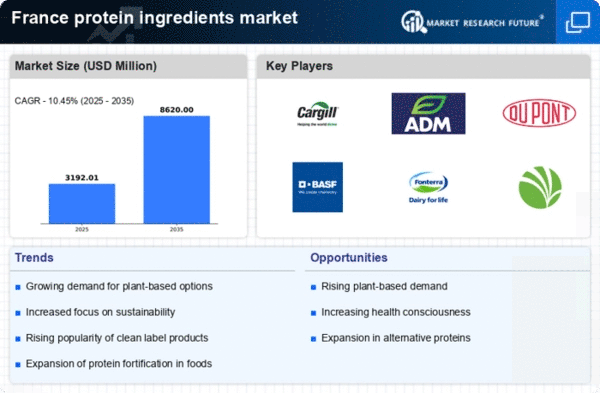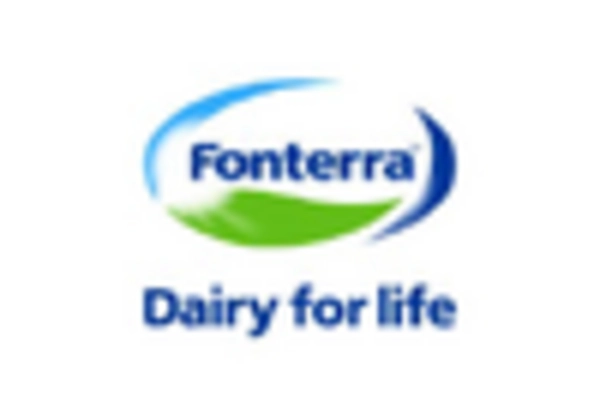Growing Health Consciousness
The increasing awareness of health and wellness among consumers in France appears to be a primary driver for the protein ingredients market. As individuals become more conscious of their dietary choices, the demand for protein-rich foods is likely to rise. This trend is reflected in the growing popularity of high-protein snacks and meal replacements, which are perceived as healthier options. According to recent data, the protein ingredients market in France is projected to grow at a CAGR of approximately 6.5% over the next five years. This growth is indicative of a broader shift towards healthier eating habits, where consumers actively seek out products that contribute to their overall well-being. Consequently, manufacturers are increasingly focusing on developing innovative protein formulations that cater to this health-conscious demographic, thereby driving the protein ingredients market forward.
Expansion of Sports Nutrition
The surge in interest in fitness and sports activities among the French population is significantly influencing the protein ingredients market. As more individuals engage in regular exercise, the demand for sports nutrition products, including protein supplements and bars, is on the rise. This trend is supported by the increasing participation in sports events and fitness programs, which has led to a heightened awareness of the importance of protein in muscle recovery and performance enhancement. Market data indicates that the sports nutrition segment is expected to account for a substantial share of the protein ingredients market, with an estimated growth rate of 7% annually. This expansion is prompting manufacturers to innovate and diversify their product offerings, ensuring that they meet the evolving needs of fitness enthusiasts and athletes alike.
Influence of Regulatory Standards
Regulatory frameworks governing food safety and labeling in France are significantly impacting the protein ingredients market. Stricter regulations regarding nutritional claims and ingredient transparency are compelling manufacturers to ensure compliance, which in turn influences product formulation and marketing strategies. The emphasis on clean labeling and accurate nutritional information is reshaping consumer expectations, leading to a demand for high-quality, transparent protein ingredients. As regulatory bodies continue to enforce these standards, manufacturers are likely to invest in research and development to meet compliance requirements while also appealing to health-conscious consumers. This regulatory landscape is expected to drive innovation within the protein ingredients market, as companies strive to align their products with evolving consumer preferences and legal standards.
Rising Demand for Sustainable Sourcing
Sustainability has emerged as a crucial consideration for consumers in France, influencing their purchasing decisions in the protein ingredients market. There is a growing preference for sustainably sourced protein ingredients, which aligns with the broader trend of environmental consciousness. Consumers are increasingly seeking products that are not only nutritious but also produced with minimal environmental impact. This shift is prompting manufacturers to adopt sustainable practices in sourcing and production, thereby enhancing their appeal to eco-conscious consumers. Recent studies suggest that products labeled as sustainably sourced can command a premium price, potentially increasing their market share. As a result, the protein ingredients market is likely to see a rise in the availability of sustainably sourced options, catering to the demands of a more environmentally aware consumer base.
Technological Advancements in Protein Extraction
Innovations in protein extraction technologies are playing a pivotal role in shaping the protein ingredients market. Advances in processing techniques, such as membrane filtration and enzymatic hydrolysis, are enabling manufacturers to produce high-quality protein ingredients more efficiently. These technological improvements not only enhance the yield and purity of protein extracts but also reduce production costs, making them more accessible to a wider range of consumers. The protein ingredients market is witnessing a shift towards more sophisticated extraction methods that can cater to diverse dietary needs, including allergen-free and plant-based proteins. As these technologies continue to evolve, they are likely to drive competition among manufacturers, fostering a dynamic market environment that prioritizes quality and innovation.
















